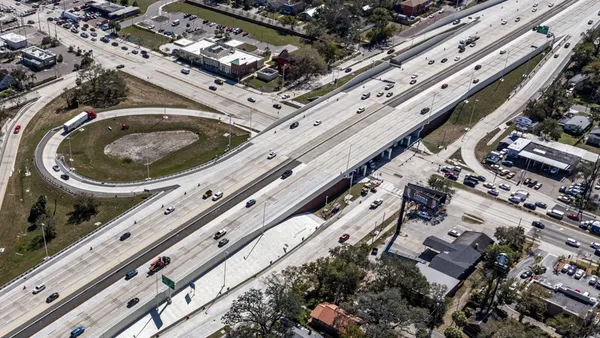Dive Brief:
- The Connecticut DOT has released a five-year, $12.1 billion capital construction plan for fiscal years 2019 through 2023 — an increase nearing $5 billion from the last five-year blueprint. The initiative, however, must secure approval in a political environment that has state lawmakers hesitant to introduce tolling, which could generate an extra $1 billion for transportation projects, according to the Hartford Business Journal.
- Another headwind that the program faces is that one of its major champions, James Redeker, the CTDOT commissioner, could be replaced when Connecticut Gov.-elect Ned Lamont takes office in January. Under Redeker, the department completed its first design-build project, the $34.7 million rehabilitation of four bridges along Route 8 in Bridgeport. The department also used the Accelerated Bridge Construction (ABC) method on the project and was able to reduce construction time from two seasons to 24 days.
- As a testament to how challenging it is for Connecticut, as well as other states, to gather funds for much-needed infrastructure projects, outgoing Gov. Dannel Malloy had to shelve about 400 CTDOT projects totaling $4.3 billion earlier this year until the legislature agreed to transfer tax revenue in order to pay for it. The department plans on using state and federal money to pay for its ambitious plan, which will see 62% of funds go to highway projects, 36% to public transportation and 2% to facilities.
Dive Insight:
As many state transportation officials struggle to carry out their construction programs within the confines of limited budgets, federal lawmakers are working toward what could be a revival of President Donald Trump’s $1 trillion national infrastructure program. The potential federal funding contributions included in such a plan could be good news for states like Connecticut.
The Wall Street Journal reported last week that Trump was considering backing off his insistence that the federal government limit its investment to 20% of the cost of state and local infrastructure projects so that he can get a deal done with Congress. The maximum federal spend of $200 billion has thus far been a sticking point with Democrats.
Since that news broke, however, a letter from Senate Minority Leader Chuck Schumer, D-N.Y., to the president has emerged in which Schumer demands that any infrastructure package include measures to combat climate change. Thus far, the president has not bought into climate change policy.
Schumer’s conditions include investment in smart grid technology and energy-efficient upgrades to public buildings, permanent tax incentives for clean energy production and money for moveable, renewable power.











